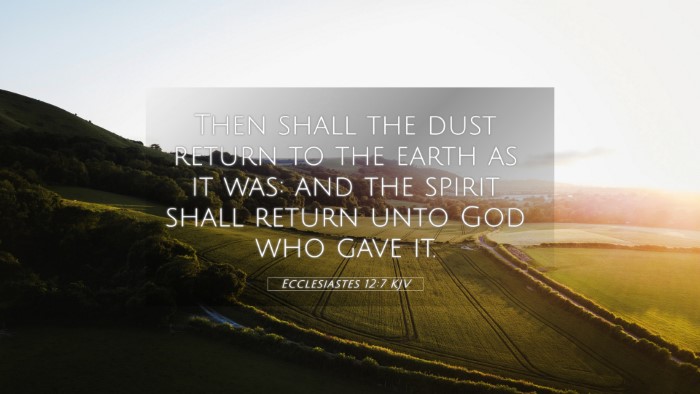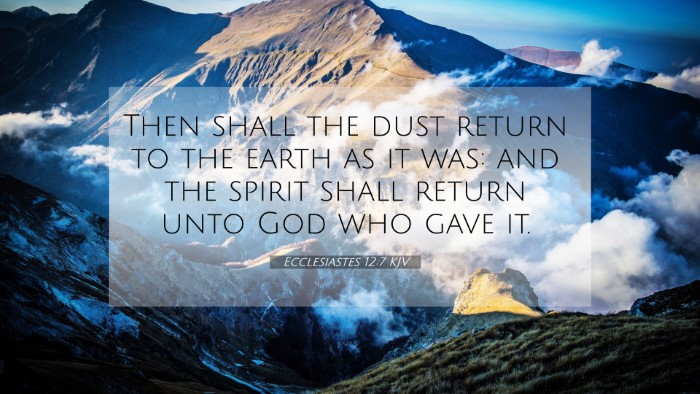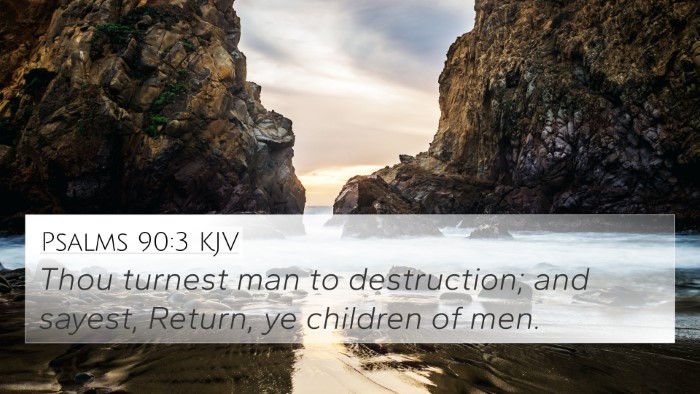Old Testament
Genesis Exodus Leviticus Numbers Deuteronomy Joshua Judges Ruth 1 Samuel 2 Samuel 1 Kings 2 Kings 1 Chronicles 2 Chronicles Ezra Nehemiah Esther Job Psalms Proverbs Ecclesiastes Song of Solomon Isaiah Jeremiah Lamentations Ezekiel Daniel Hosea Joel Amos Obadiah Jonah Micah Nahum Habakkuk Zephaniah Haggai Zechariah MalachiEcclesiastes 12:7 Similar Verses
Ecclesiastes 12:7 Cross References
Then shall the dust return to the earth as it was: and the spirit shall return unto God who gave it.
Uncover the Rich Themes and Topics of This Bible Verse
Listed below are the Bible themes associated with Ecclesiastes 12:7. We invite you to explore each theme to gain deeper insights into the Scriptures.
Ecclesiastes 12:7 Cross Reference Verses
This section features a detailed cross-reference designed to enrich your understanding of the Scriptures. Below, you will find carefully selected verses that echo the themes and teachings related to Ecclesiastes 12:7 KJV. Click on any image to explore detailed analyses of related Bible verses and uncover deeper theological insights.

Daniel 12:2 (KJV) »
And many of them that sleep in the dust of the earth shall awake, some to everlasting life, and some to shame and everlasting contempt.

Psalms 146:4 (KJV) »
His breath goeth forth, he returneth to his earth; in that very day his thoughts perish.
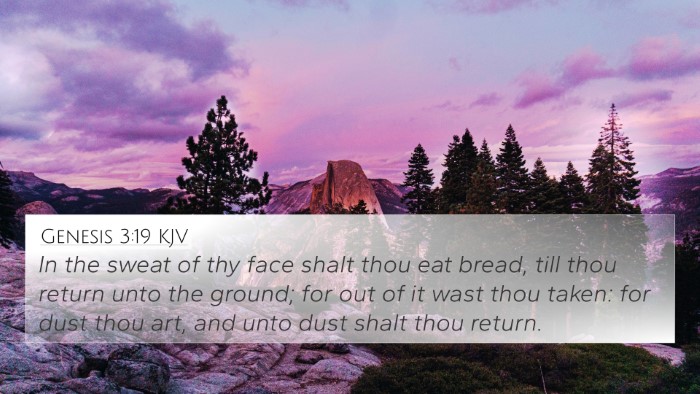
Genesis 3:19 (KJV) »
In the sweat of thy face shalt thou eat bread, till thou return unto the ground; for out of it wast thou taken: for dust thou art, and unto dust shalt thou return.
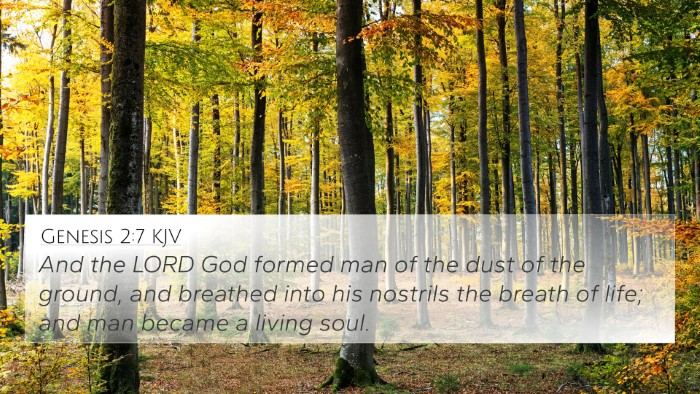
Genesis 2:7 (KJV) »
And the LORD God formed man of the dust of the ground, and breathed into his nostrils the breath of life; and man became a living soul.
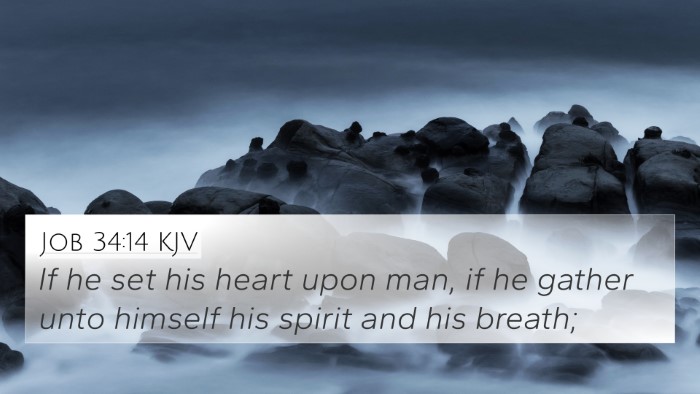
Job 34:14 (KJV) »
If he set his heart upon man, if he gather unto himself his spirit and his breath;
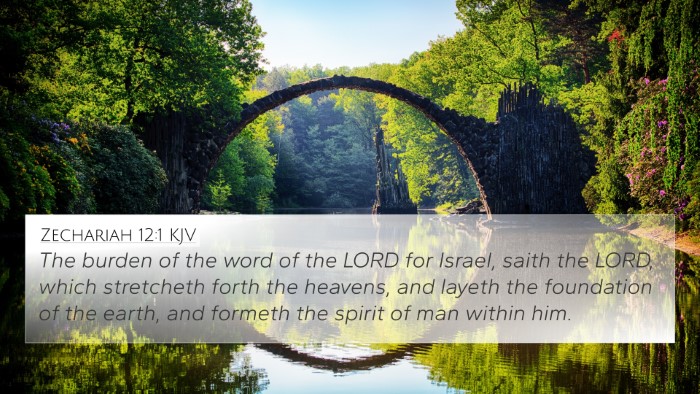
Zechariah 12:1 (KJV) »
The burden of the word of the LORD for Israel, saith the LORD, which stretcheth forth the heavens, and layeth the foundation of the earth, and formeth the spirit of man within him.

Isaiah 57:16 (KJV) »
For I will not contend for ever, neither will I be always wroth: for the spirit should fail before me, and the souls which I have made.
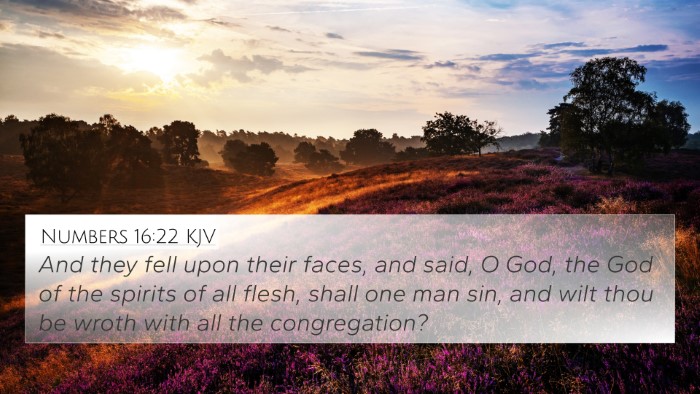
Numbers 16:22 (KJV) »
And they fell upon their faces, and said, O God, the God of the spirits of all flesh, shall one man sin, and wilt thou be wroth with all the congregation?

Job 20:11 (KJV) »
His bones are full of the sin of his youth, which shall lie down with him in the dust.
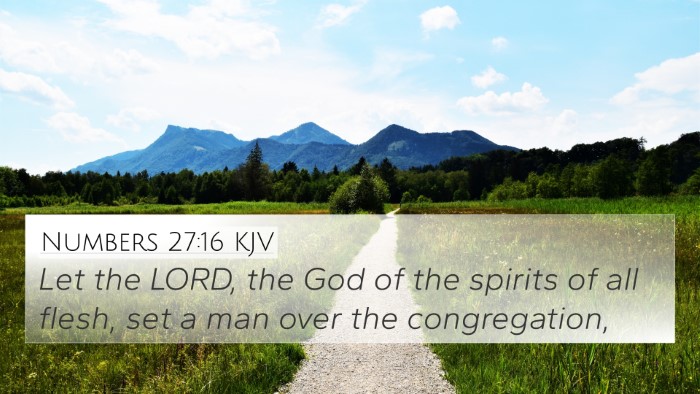
Numbers 27:16 (KJV) »
Let the LORD, the God of the spirits of all flesh, set a man over the congregation,
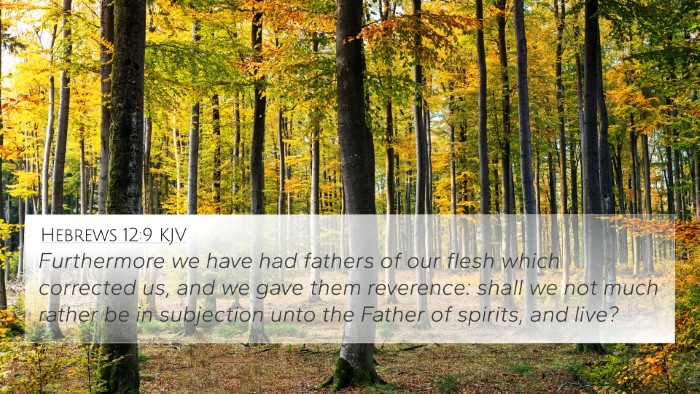
Hebrews 12:9 (KJV) »
Furthermore we have had fathers of our flesh which corrected us, and we gave them reverence: shall we not much rather be in subjection unto the Father of spirits, and live?
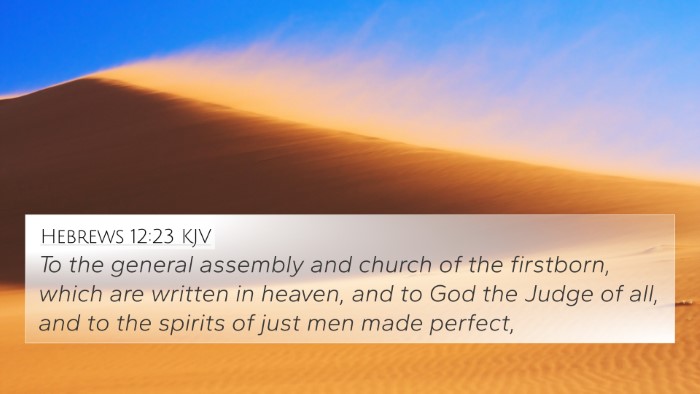
Hebrews 12:23 (KJV) »
To the general assembly and church of the firstborn, which are written in heaven, and to God the Judge of all, and to the spirits of just men made perfect,
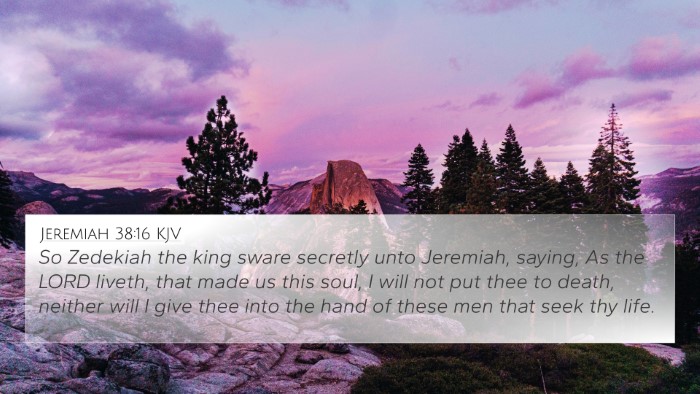
Jeremiah 38:16 (KJV) »
So Zedekiah the king sware secretly unto Jeremiah, saying, As the LORD liveth, that made us this soul, I will not put thee to death, neither will I give thee into the hand of these men that seek thy life.
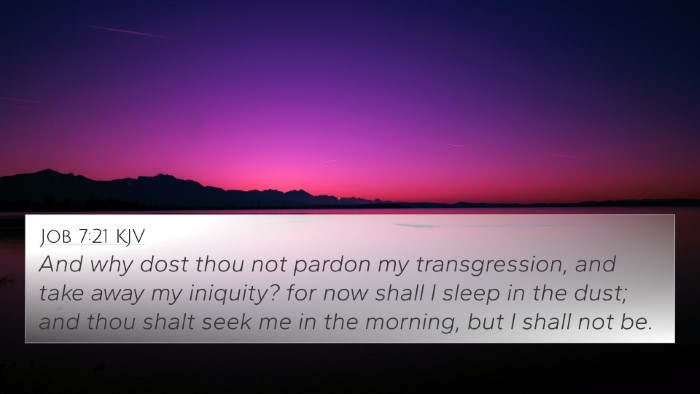
Job 7:21 (KJV) »
And why dost thou not pardon my transgression, and take away my iniquity? for now shall I sleep in the dust; and thou shalt seek me in the morning, but I shall not be.
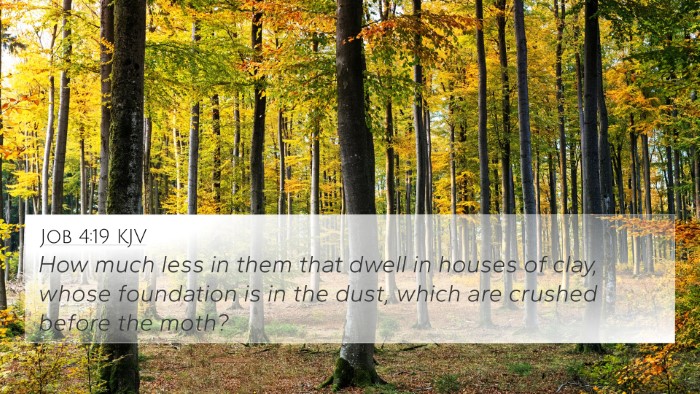
Job 4:19 (KJV) »
How much less in them that dwell in houses of clay, whose foundation is in the dust, which are crushed before the moth?
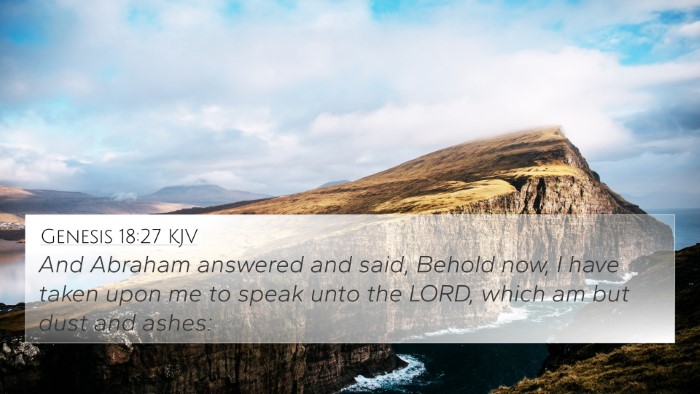
Genesis 18:27 (KJV) »
And Abraham answered and said, Behold now, I have taken upon me to speak unto the LORD, which am but dust and ashes:
Ecclesiastes 12:7 Verse Analysis and Similar Verses
Understanding Ecclesiastes 12:7
Ecclesiastes 12:7 states, "And the dust returns to the earth as it was, and the spirit returns to God who gave it." This verse encapsulates the cyclical nature of life, emphasizing both the physical and spiritual aspects of human existence.
Summary of the Verse Meaning
This verse draws attention to the duality of human nature — the body and spirit. Observations from public domain commentaries by notable theologians such as Matthew Henry, Albert Barnes, and Adam Clarke provide insightful interpretations:
- Matthew Henry interprets this verse as a reminder of mortality, stressing that our physical bodies return to the earth, while our spirits ascend to God. This balance highlights the transient nature of life and the enduring aspect of the soul.
- Albert Barnes elaborates on the significance of the spirit returning to God, indicating that it reaffirms the belief in divine governance and judgment. The return of the spirit suggests accountability for one’s earthly actions, grounding the importance of living righteously.
- Adam Clarke emphasizes the human composition of body and soul, remarking that while our physical forms may perish, our spirits, having been endowed by God, continue to exist. Clarke insists that this dichotomy enriches our understanding of life beyond the physical realm.
Key Themes and Insights
Ecclesiastes 12:7 embodies several themes that resonate throughout the Bible:
- Mortality and Transformation: The return of dust to the earth signifies the temporary nature of our physical forms.
- Accountability and Judgment: The returning spirit emphasizes our responsibility before God for our actions.
- Divine Origin of Life: The verse confirms that life itself is a gift from God, highlighting His sovereignty over creation.
Bible Verse Cross-References
Several scriptures illustrate the concepts presented in Ecclesiastes 12:7, showcasing inter-biblical dialogue:
- Genesis 3:19: "By the sweat of your face you shall eat bread, till you return to the ground, for out of it you were taken; for you are dust, and to dust you shall return." This verse reinforces the idea of physical return to earth.
- Job 34:14-15: "If he should set his heart to it and gather to himself his spirit and his breath, all flesh would perish together, and man would return to dust." Job echoes the theme of God’s authority over life and death.
- Psalm 104:29: "When you hide your face, they are dismayed; when you take away their breath, they die and return to their dust." This echoes the connection between life’s breath and physical existence.
- 2 Corinthians 5:1: "For we know that if the tent that is our earthly home is destroyed, we have a building from God, a house not made with hands, eternal in the heavens." This New Testament verse emphasizes the hope of eternal life beyond physical decay.
- Luke 23:46: "Then Jesus, calling out with a loud voice, said, 'Father, into your hands I commit my spirit!' And having said this, he breathed his last." This moment shows the spirit’s return to God.
- Hebrews 9:27: "And just as it is appointed for man to die once, and after that comes judgment." This verse is significant in linking the earthly existence to spiritual accountability post-death.
- Revelation 12:6: "The woman fled into the wilderness, where she has a place prepared by God." This portrays God’s active role in the destiny of souls.
Connections Between Bible Verses
The verse has profound implications when considered alongside other scriptures. By applying a Bible concordance or a Bible cross-reference guide, one can uncover additional layers of meaning, enhancing knowledge through thematic connections:
- For full understanding, a cross-reference Bible study should encompass those verses that address the creation, purpose, and destiny of mankind.
- Implementing tools for Bible cross-referencing can help in identifying connections between Old and New Testament teachings, particularly in concepts concerning mortality and eternal life.
- A comprehensive Bible cross-reference system can uncover Bible verses that relate to each other through themes of judgment, creation, and the nature of human existence.
Thematic Reflections
Through thematic Bible verse connections, Ecclesiastes 12:7 reflects the larger narrative of Scripture concerning human life:
- The cyclical nature of life and death.
- The redemption and hope found in the promise of eternal life through Christ.
- The responsibility of humans to live according to God's principles, knowing that they will face divine judgment.
Conclusion
Ecclesiastes 12:7 is a reminder of the physical mortality that all humans face paired with the spiritual dimension of life after death. Utilizing proper Bible cross-reference tools can aid in a deeper comprehension and appreciation of this passage. By engaging in a thorough comparative Bible verse analysis, believers can enrich their theological understanding through scriptural cross-referencing.

